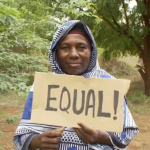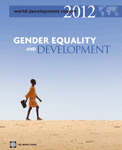The World Bank Group, UN agencies, and Data2X are aiming to fill vast data gaps related to women and girls and taking on a global assessment of the value of women’s work, as part of a broad effort to empower them and end extreme poverty. Read the announcement here.
World Bank publication on Voice and Agency available for download
The World Bank Group has released for purchase and free download its groundbreaking report Voice and Agency: Empowering Women and Girls for Shared Prosperity. The 2012 report recognized that expanding women's agency - their ability to make decisions and take advantage of opportunities is key to improving their lives as well as the world. This report >> Read more
Gender-Based Policies and Economic Growth
The World Bank’s policy note series Economic Premise recently put out a note on “Measuring the Effect of Gender-Based Policies on Economic Growth”. The note lays out a framework for quantifying the growth effects of gender-based policies in developing economies, a powerful and practical tool for policy makers and policy researchers. This tool was developed >> Read more
New Report: Gender in Climate Change in Bangladesh: The Role of Institutions in Reducing Gender Gaps in Adaptation
Are women more vulnerable to climate change then men? If so, what are the factors which contribute to these increases and what can be done to help increase the resiliency of both women and men to the negative impacts of climate change? For answers to these questions and more, please visit Genderinag.org to find a recent >> Read more
Resource: EAtas of Gender
The World Bank has launched the World Bank eAtlas of Gender, a companion of the recent World Development Report 2012: Gender Equality and Development, were several IFPRI staff contributed. You will find maps gender related indicators:wages, earnings, mean age at marriage, leave benefits, school enrolment rates, violence against women and more—over time and across countries). >> Read more
News: In Kenya, Survey of Female Farmers Uncovers Challenges
A World Bank survey in Kenya that seeks women’s input and data to inform agricultural policy shows that female farmers have limited access to water, energy and finance, and few women own property they can use as collateral for loans. As agriculture becomes ‘feminized’ and men abandon farms to work in cities, policies must change to >> Read more
Publication: World Development Report 2012: Gender Equality and Development
This year's World Development Report: Gender Equality and Development, published by the World Bank, argues that gender equality is a core development objective in its own right. It is also smart economics. Greater gender equality can enhance productivity, improve development outcomes for the next generation, and make institutions more representative. The Report also focuses on four >> Read more
Publication: Latest from the World Bank’s Gender and Development Unit
It highlights recent Bank initiatives which seek to promote the economic empowerment of women and gender equality, and to encourage others to do the same. Access it here
Publication: Gender Disparities in Africa’s Labor Market
Gender inequality in the labor market remains a pressing problem of contemporary Africa. Available evidence shows that in several countries of the region women are less likely to be in paid work, are disproportionately concentrated in informal and precarious employment, and are paid substantially less. This novel study, a collaboration between the World Bank and >> Read more
Publication: Innovations in Land Rights, Recognition, Administration & Governance
Joint Organizational Discussion Paper—Issue 2 THE WORLD BANK, GLTN, FIG, AND FAO. Authors: Klaus Deininger, Clarissa Augustinus, Stig Enemark, and Paul munro-faure This volume is a product of the Annual Conference on Land Policy and Administration that is jointly organized by the International Bank for Reconstruction and Development/The World Bank, the Global Land Tool Network, >> Read more


